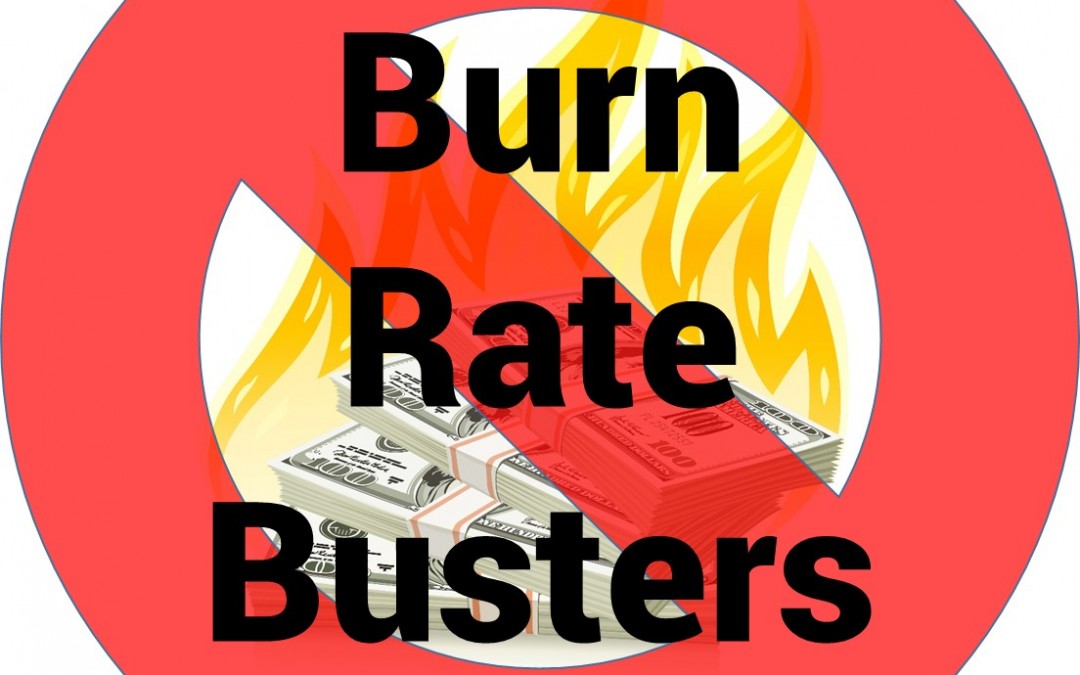In my opinion, Burn Rate should be a 4-letter word. Yes – a profanity, curse or swear-word bordering on blasphemy. I agree that statement is a bit over the top, but wanted to be clear on my meaning because a great deal of profanity is now much longer than 4 letters. On a more serious note, I understand that significant investment is often required to launch a business. Sometimes it is needed to grow fast enough to suppress competition. Sometimes to gain critical momentum in the marketplace, or for other reasons. Yet I think the concept of burn rate is bad for startups, and provide four reasons below. I welcome your feedback – pro, con, or additional insight.
- Burn Rate is disrespectful to capital. The phrase itself encourages disregard for the responsibility of the startup to provide a return to the investor, especially among inexperienced employees. It also implies a lack of respect for the intelligence and effort required to create that investment capital. If someone literally asked you to give them all of the money you had in your purse, wallet or pocket because they wanted to burn it, what would your reaction be? Are you really Ok with seeing your “soldiers of financial freedom” going up in smoke at someone else’s whim? We all understand the power of words to shape our beliefs, attitudes, and actions. Are we OK with the beliefs and attitudes that are likely to flow from the concept of burn rate? Is it a good thing that sometimes people seem to almost brag about their company’s high burn rate? Does the phrase “burn rate” diminish the emotional impact? Would shifting to something along the lines of “hemorrhaging money”, such as “Bleed Rate”, be better because it associates some perception of pain or negative outcome to having a burn rate?
- The concept of Burn Rate encourages overspending and over hiring. If significant capital wasn’t available or you were bootstrapping the business, would you be moving into Class A office space and buying new furniture, or would a WeWork or Regus space be fine? Many great companies grew up in a garage or at a kitchen table, and isn’t a roof, four walls and high-speed internet all we really need to get a business started if we really had to? Without the luxury of capital, would you be throwing bodies at a problem, or figuring out what is wrong with the process? Would you be engaging the marquee-brand marketing company, or the hungry team that just left them to start their own shop? Would you be hiring CxO titles, or bringing in capable people needed to get specific things done effectively who could grow into a larger role when appropriate? Would you be building internal capacity for processes that are not critical to your differentiation in the market, or developing outsourcing relationships with companies specializing in that area who already have the systems required and the economies of scale working for them (and you)? How big a role would existing Saas (software as a service) and automation play in the organization if a high burn rate was not OK? How might salaries be different? I’m not advocating self-denial and austerity, but if necessity was the mother of invention, it may be worth checking in now and then to see how she might feel about your current spending plan.
- The concept of Burn Rate reduces the focus required to succeed. If there is a belief that there is plenty of capital on hand to burn and you can always raise more if you start to run out, it can be easier to get distracted from what I consider a company’s core – providing a unique value to the target customer. Providing value so effectively that they become loyal, rather than simply satisfied. Some startups get off track by shifting gears when reaching the goal gets difficult. Some try to be more things to more people, believing that more is always a good thing. In a creative, startup environment overflowing with ideas it can be tough to resist “mission creep”. When you have confidence in yourself and your team, and there appears to be plenty of cash to handle a higher burn rate, it can be hard to say no to “opportunities”. To say, “In addition to the minimum viable product research showed we should deliver, we can also do x, y, and z and be even bigger, faster.” In reality, to paraphrase Steve Jobs, sometimes it is the things you say no to that make you great. Focus is also part of the “Power of Broke” Daymond John credits to his success. If so, then getting to market quickly and efficiently should be priority one. In that scenario, line extensions and brand expansions would be funded from the profits of the initial success. If there is no initial success, you can be confident that you gave the idea the effort it deserved, and know your focus helped keep the damage contained.
- Burn Rate undermines the financial discipline essential to long-term survival. At the end of the month, quarter, or year, cash flow is king. A sustainable, growing business requires cash flow and cash management. It requires planning the path to revenue and profit, with a worthy first goal being the break-even point. This requires anticipating future costs, and building them (plus the inevitable unforeseen ones) into the business model. It requires understanding the timing of cash flow and the capital required to fund several business cycles of growth beyond the break-even point. It requires budgeting and managing expenses as a percentage of sales, and planning to thrive within your means. Unfortunately, the very concept of burn rate makes fiscal discipline seem like something that can be put off to some future date. It permits the delusion that we’ll be profitable when we scale (the old joke about “we lose money on every sale but we’ll make it up in volume” comes to mind). And once things are rolling, how might bolting on a more robust financial framework impact corporate culture and employee retention? If you are a founder, you may want to ask yourself if implementing a financial framework at the start increase your chances of remaining in control when the company does scale.
One way to sum up these concerns could be to say that the concept of burn rate may imprint a lack of regard for profit on a company culture. As I’ve said before, “There are a million ways to die in a business, and most of them have to do with money.” Studies suggest that 70% of businesses fail, but in my opinion, it doesn’t have to be that way. Many more businesses could succeed, and some could do extraordinarily well with better planning and a bit of discipline. In my opinion, how we talk about money and its allocation can greatly impact the outcome. There are no easy answers, but there are a lot of questions worth asking when starting and building a company.
What are your thoughts on burn rate and its impact on startup success? Do you think that Bleed Rate is a better metaphor? Please take a moment to share the insight of your experience.


